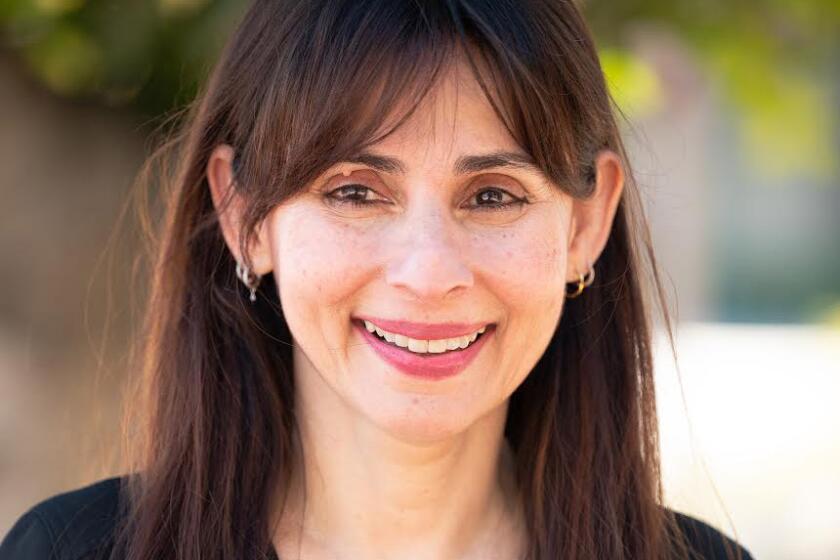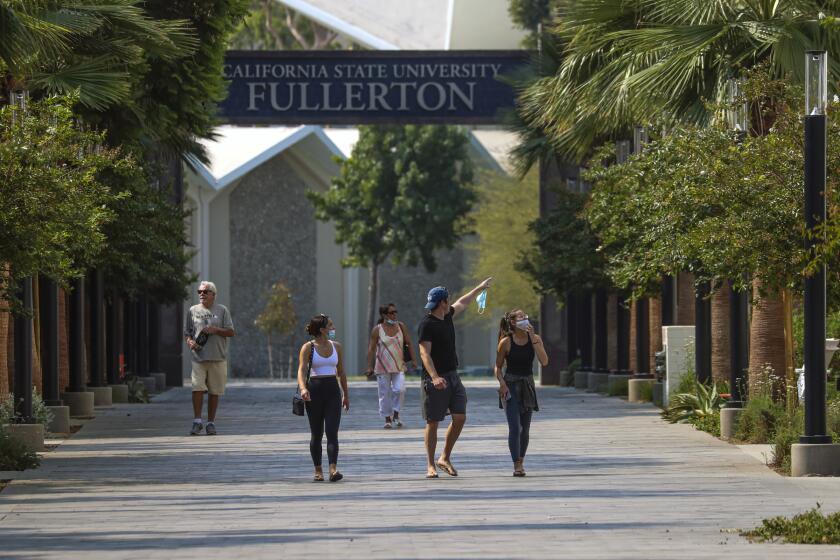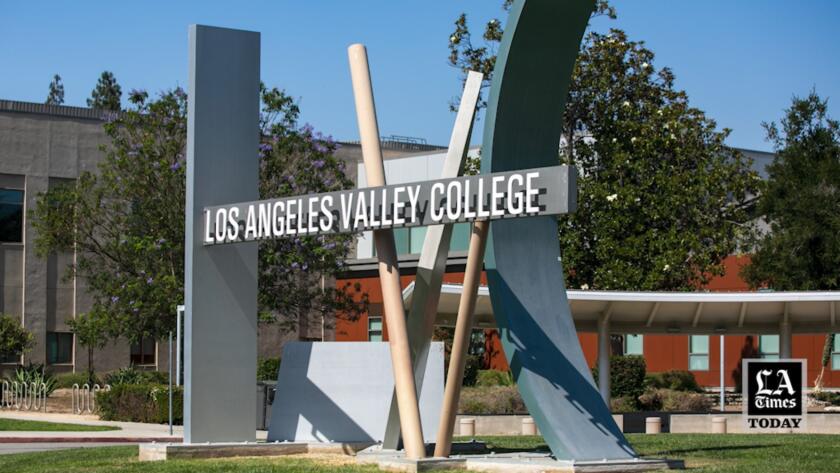Where to get a low-cost bachelor’s degree close to home and a job lead: Community college
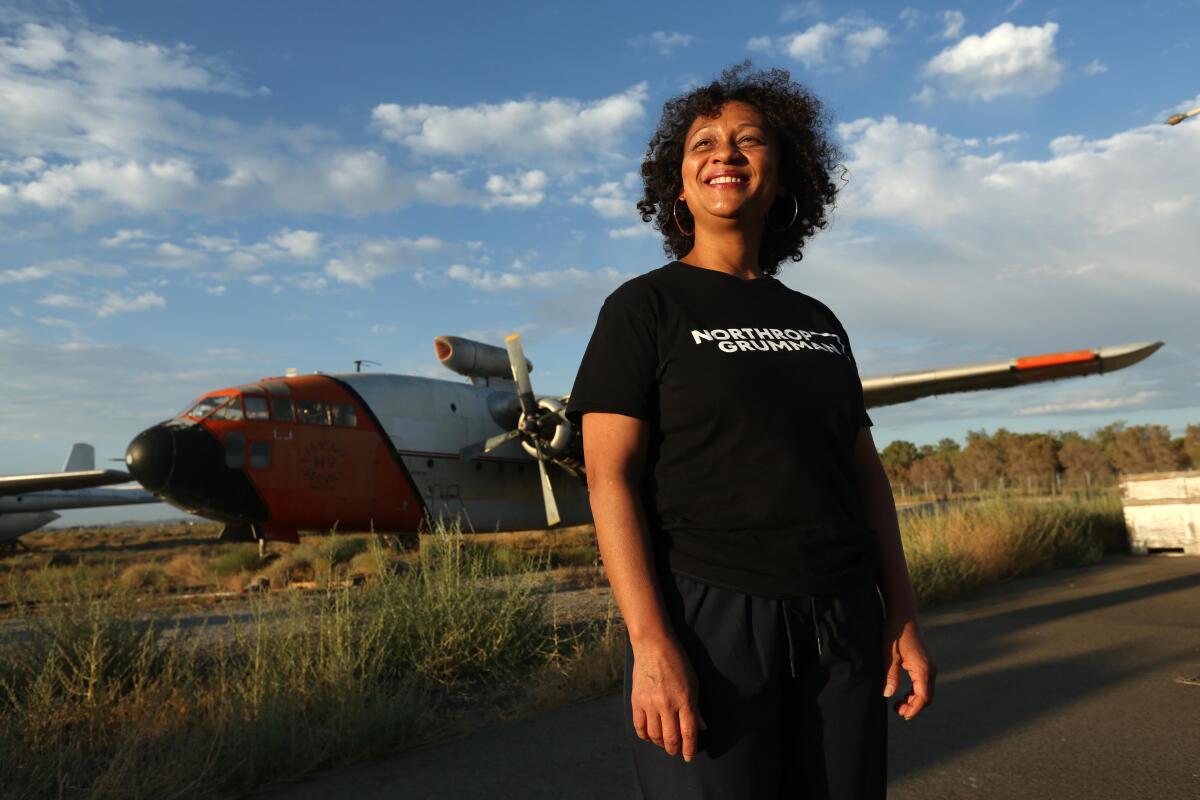
- Share via
It took nearly two decades for Promise Roberts to earn a college degree. She first enrolled at Antelope Valley College in 1994, earning an associate’s degree in 2013 while raising children and building a hairdressing business.
But, she said, “I wanted more.” In 2022, she graduated with a bachelor’s degree in airframe manufacturing technology and landed a job near home without ever leaving the community college.
More and more of California’s 116 community colleges — struggling to remake themselves under pressure from declining enrollment — are venturing into higher education territory traditionally reserved for four-year institutions, offering bachelor’s degrees that lead to careers in high-demand fields: dental hygiene, bio-manufacturing, automotive technology. In 2021 the state authorized community colleges to offer specialized degrees as long as they did not duplicate those offered by Cal State and University of California campuses.
But the new offerings have stirred friction among Cal State University administrators, who have pushed back on some proposals, arguing they too closely resemble bachelor’s programs offered by Cal State, a skirmish between the two giant systems that highlights their territorial competition for students — and shortcomings in the way the new degrees are approved.
After a successful pilot program, the state has allowed the 116-campus system to add up to 30 new baccalaureate programs each year. Chancellor Sonya Christian says the degrees will become a mainstay in a broader remake of how the state’s community colleges operate. A community college bachelor’s degree is a less expensive option for students who cannot uproot their lives to enroll at a University of California or Cal State campus.
“If they want to do a bachelor’s degree, we should not have barriers,” Christian said. “Period.”
Community college leaders say they want to tap into a population of learners who otherwise wouldn’t attend a four-year college — students like Roberts, who had never entertained the idea of commuting “down below” from the Antelope Valley to Los Angeles to earn a bachelor’s degree.
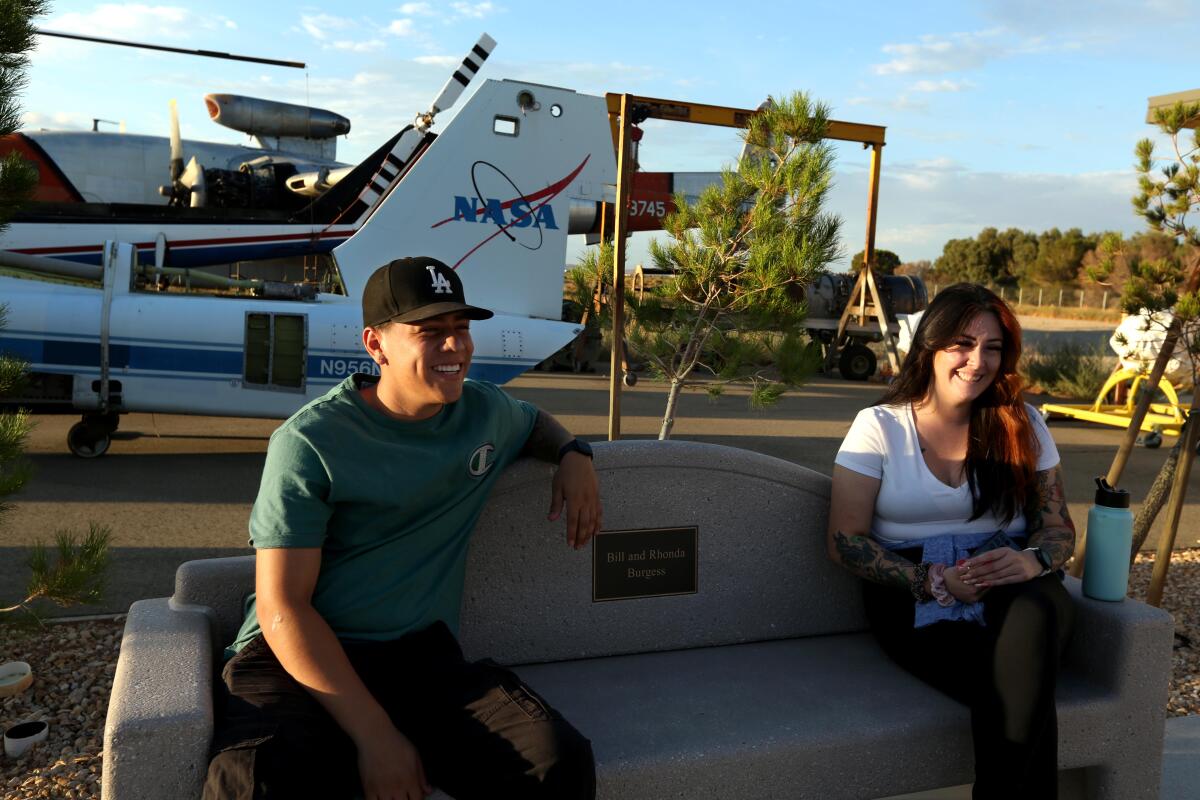
A cheaper degree, close to home
Antelope Valley College signed on to the state’s pilot program after it launched in 2014, seeing an opening to prepare students for local jobs at aerospace employers in the region, including Lockheed Martin and Northrop Grumman.
Many Antelope Valley students were already landing jobs on assembly lines, building aircraft with an associate’s degree in aircraft fabrication and assembly. But they couldn’t advance to managerial positions without a bachelor’s degree, according to Gregory Bormann, dean of career and technical education at the college. The airframe manufacturing technology program broke ground as among the first such baccalaureate programs in the state.
The college receives about 50 applications each year for 20 spots.
Sonja Christian took over as chancellor on June 1. Her plans include expanding dual enrollment for high school students and courting older learners, many of whom left school during the pandemic.
Sierra Reynolds, 25, said she moved from Gardena to “Aerospace Valley” after learning of its reputation for aviation. Now a fourth-year student, she hopes to one day work as a manufacturing engineer.
“The work is out here. My heart is out here,” said Reynolds, who also works at Edwards Air Force Base. “Well, the work is my heart.”
West Los Angeles College’s dental hygiene program was also among the first group of baccalaureate programs, with about 100 students each year.
Most of the other colleges in the region that offer baccalaureate programs in dental hygiene are private universities, where tuition can run more than $120,000. Tuition for the bachelor’s program at West Los Angeles costs about $10,000.
Omar Hernandez explored dental hygiene programs at USC and West Coast University before enrolling at West Los Angeles. A deciding factor was the cost.
At a private college, the 30-year-old from Montecito Heights faced the prospect of taking out tens of thousands of dollars in student loans. Most of his community college tuition is covered by financial aid.
“We’re looking at maybe a $140,000 difference,” he said.
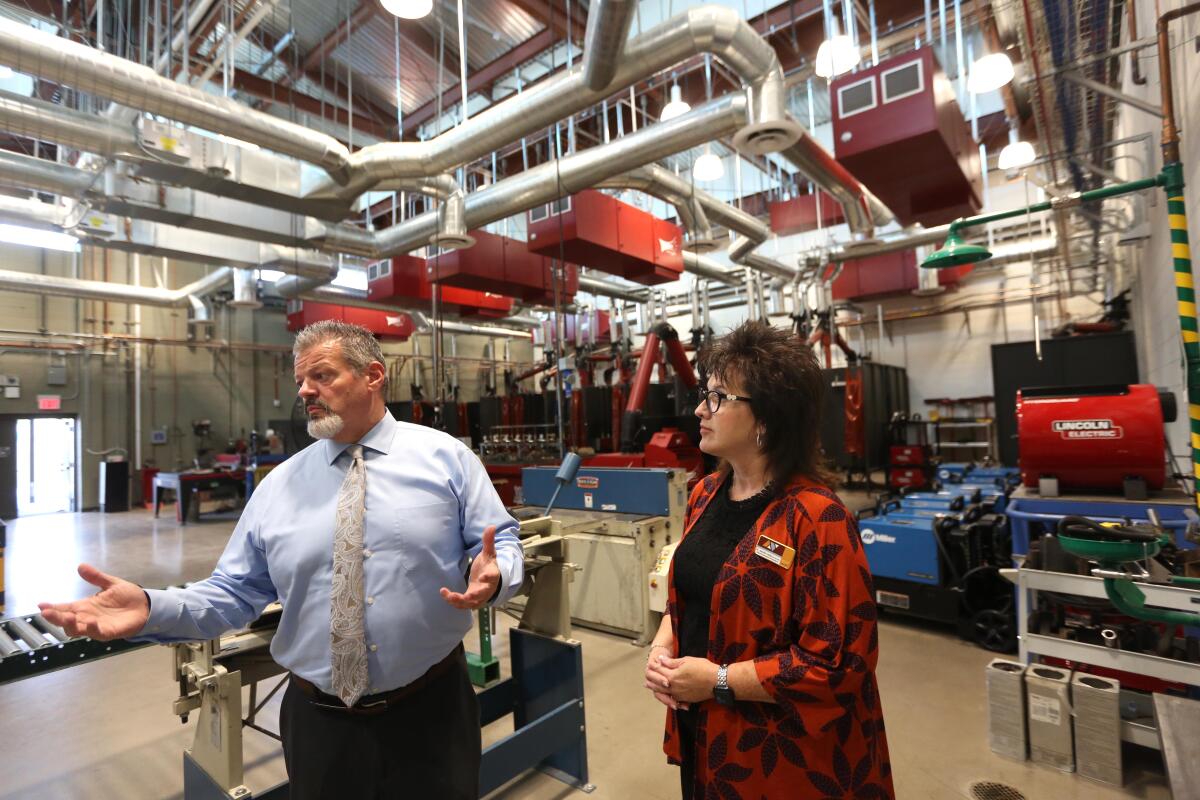
A study by the Civil Rights Project at UCLA published in April found that community college bachelor degree programs offer “access to a college degree as well as ... help meet the state’s urgent need for college educated workers.”
“The value proposition that exists currently is you have to move, you have to go somewhere else in order to take advantage of opportunities,” said Cecilia Rios-Aguilar, an education professor at UCLA who co-authored the report. “And here we’re saying, wait a second, you can stay in the community where you’re invested. Where you want to be.”
Other states, including Washington and Florida, have found community college baccalaureate programs to be popular.
Nearly all of the 34 community colleges in Washington offer what’s known as applied bachelor degrees focusing on technical education in fields such as cybersecurity and business, said Valerie Sundby, director of transfer education at the Washington State Board for Community and Technical Colleges.
Two years ago, the state legislature gave community colleges authority to offer bachelor of science degrees in computer science, a move Sundby said was heavily backed by Amazon, which is headquartered in Seattle.
Shortcomings in the law
Under state law, Cal State and University of California may object to proposed community college degree programs they believe duplicate existing programs. The systems must meet to discuss the disagreements and come to “a written agreement before the program is approved.”
But the law does not define what it means for a program to be duplicative, nor does it describe who should decide if a program can move forward if the systems cannot reach resolution.
The trouble spot surfaced in public last academic year after the community college chancellor’s office approved a bachelor’s degree program in applied fire management at Feather River College in Plumas County over fierce objections from Cal State officials, who argued it duplicated offerings of at least three other campus programs.
“I was quite frankly shocked and disheartened when last month the California community colleges acted unilaterally to approve the Feather River program,” said Interim CSU Chancellor Jolene Koester during a March meeting. “That approval came despite clear programmatic duplication.”
Two lawmakers urged community college leaders to pause approving new degrees until the approval issue could be clarified.
Students from across Cal State’s 23 campuses traveled to Long Beach to protest the tuition increase.
Community colleges did not pause applications, but both systems say they are working together to create criteria for how to handle disagreements over duplication. One of the lawmakers, Assemblymember Mike Fong (D-Alhambra), said he is pleased with the progress between the systems.
“We know that California needs to increase the overall amount of baccalaureate degrees we produce, and that both the community colleges and the CSU play a unique role in that pipeline,” he said in a statement.
Since the state expanded community college baccalaureate programs in January 2022, 31 have been approved. State community college officials accept proposals during two application windows each year.
During the last round of applications earlier this year, Cal State objected to half of the 14 programs the community college system chose to move forward. The fate of those programs — including a stem cell and gene technologies program at Pasadena City College and cloud computing program at Santa Monica College — are on hold as the systems negotiate.
Seven other programs Cal State did not dispute include dental hygiene programs at Cerritos College and Fresno City College, a respiratory therapy program at Los Angeles Valley College and an aviation maintenance technology program at West Los Angeles.
Nathan Evans, deputy vice chancellor of academic and student affairs for Cal State, said the system is “extraordinarily supportive” of community college baccalaureate programs that don’t overlap with CSU offerings, such as respiratory therapy.
But he said the state must be mindful of not “creating situations that are inefficient or are a waste of taxpayer money” by developing programs that resemble those already in place in other systems.
A report published in 2020 by the Legislative Analyst’s Office evaluated the initial bachelor’s degree programs approved during the pilot. The findings were mixed. The report found the programs offered many benefits to students, including affordability. It also found that some programs were small, operating with less than 15 students per cohort.
Aisha Lowe, executive vice chancellor for the state community college system, said students who enroll in community colleges “potentially don’t have any other option” for a four-year degree program. They’re largely students of color from low-income families who find themselves shut out of the competitive college admissions process or whose opportunities are limited because of where they live.
“We do not believe there is any competition here,” Lowe said. “We do not believe that there’s any threat of taking away from CSU enrollment.”
The system is preparing to open its fourth round of bachelor’s degree programs in October, and Lowe expects to see an uptick in applicants.
“I feel like I’m getting a career.”
Classrooms for the airframe manufacturing technology program at Antelope Valley College sit outside a hangar on an airfield six miles from the main campus.
The program sailed through approvals without complaints from Cal State. Antelope Valley College President Jennifer Zellet said that’s because the college developed a program only it could pull off given the college’s relationship and proximity to aerospace companies.
She added that the community college program doesn’t pose a threat to the state’s four-year public higher education systems because they educate “radically different” populations. Community college students tend to be older than the traditional 18- through 24-year-old students who enroll at four-year campuses.

The program at Antelope Valley College prepares students for a variety of jobs, including aerospace maintenance, airframe manufacturing and roles as quality assurance inspectors and supervisors, according to Alfred Brubaker, chair of the aeronautical sciences and technologies department at the college.
He’s taught students straight out of high school to people in their 60s. Most of the students work, so classes required for the programs are held during the evenings.
Twenty-nine-year-old Mary Alvarez decided to enroll at Antelope Valley College after working 12-hour shifts at a grocery store during the height of the pandemic, stocking shelves that customers would wipe bare in minutes.
“I knew I didn’t want to be at the grocery store my whole life,” she said. “But that was it.”
Alvarez completed her associate’s degree in aircraft fabrication and assembly in 2021, and currently works as a structures mechanic at Northrop Grumman. She makes $11 more an hour than she did at the grocery store.
She returned to the college for her bachelor’s degree and takes classes in the evening after work. She hopes to become a mechanical engineer.
“I’ll actually be the first one in my family to actually have a bachelor’s degree, which is pretty cool,” she said. “I feel like I’m getting a career.”
Roberts, who graduated from the program in 2022, is now a structures technician at Northrop Grumman, where she helps assemble aircraft. She also recently started teaching a course on blueprints as an adjunct instructor at Antelope Valley College.
She made decent money as a hairdresser, but she could never guarantee she could generate enough business each month to cover all her costs. Now she has a reliable paycheck and benefits including a 401(k) retirement plan and employer-sponsored health coverage.
“Now I go to bed and I sleep like a baby because for 30 years as a hairdresser I always thought: ‘How am I going to make my mortgage this month?’” she said.
Roberts doesn’t have any plans to slow down. She’s already plotting her next move: a master’s degree.
- Share via
Watch L.A. Times Today at 7 p.m. on Spectrum News 1 on Channel 1 or live stream on the Spectrum News App. Palos Verdes Peninsula and Orange County viewers can watch on Cox Systems on channel 99.
More to Read
Sign up for Essential California
The most important California stories and recommendations in your inbox every morning.
You may occasionally receive promotional content from the Los Angeles Times.
